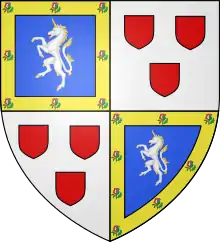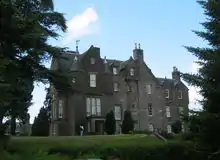Thomas Hay, 7th Earl of Kinnoull
Thomas Hay, 7th Earl of Kinnoull (1660 – 5 January 1719), styled as Viscount Dupplin from 1697–1709, was a Scottish peer and Conservative politician.
The Earl of Kinnoull | |
|---|---|
 Coat of arms of the Earls of Kinnoull | |
| Member of Parliament for Perthshire | |
| In office 1693–1697 | |
| Representative Peer in First Parliament of Great Britain | |
| In office 10 November 1710 – 5 January 1715 | |
| Personal details | |
| Born | 1660 |
| Died | 5 January 1719 (age 58-59) London, United Kingdom |
| Nationality | Scottish |
| Political party | Conservative |
| Spouse |
Elizabeth Drummond (m. 1683) |
| Children |
|
| Parents |
|
Biography

He was a descendant of Peter Hay of Rattray, Perthshire (younger brother of George Hay, 1st Earl of Kinnoull) and Margaret Boyd.[1] Thomas Hay was a Tory member of the Scottish parliament for Perthshire between 1693 and 1697. He was created Viscount Dupplin on 31 December 1697. He resided at the family seat of Balhousie Castle.[2]
William Hay, 6th Earl of Kinnoull, a supporter of King James II and VII, resigned his titles after the king's abdication. William was given a life peerage by Queen Anne and upon his death on 10 May 1709, the titles passed to Thomas.
He was a commissioner for the Union of English and Scottish Parliaments in 1707. He sat in the First Parliament of Great Britain as one of 16 representative peers between 1710 and 1714.[3]
The earl and his heir were briefly imprisoned in Edinburgh Castle on suspicion of Jacobite sympathies during the 1715 uprising.[2]
Marriage and issue
He married Lady Elizabeth, daughter of William Drummond, 1st Viscount Strathallan, on 20 December 1683. They had five children:[2]
- Lady Margaret Hay (30 September 1686 – 26 April 1707), married John Erskine, 6th Earl of Mar on 6 April 1703
- Lady Elizabeth Hay (d. 1723), married James Ogilvy, 5th Earl of Findlater
- George Henry Hay (23 June 1689 – 28 July 1758), married Lady Abigail Harley, daughter of Robert Harley, 1st Earl of Oxford and Earl Mortimer.
- William Hay, died before 1711
- John Hay of Cromlix (1691–1740) created the Earl of Inverness
References
- Paul, James Balfour (1908). The Scots Peerage. D. Douglas. p. 229.
- Paul 1908, p. 231.
- A Genealogical and Heraldic Dictionary of the Peerage and Baronetage of the British Empire. Vol. 42. Henry Colburn. 1880. p. 708.